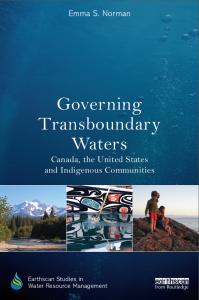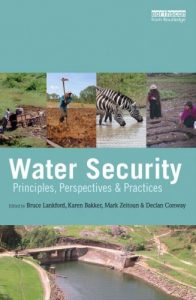2015
Microbial risk governance: Challenges and opportunities in Canada
Dunn, G., Harris, L. and Bakker, K. (2015). Microbial risk governance: Challenges and opportunities in Canada. Canadian Water Resources Journal, 40(3): 237-249. [Open Access]
Indigenous water governance in British Columbia and Canada: Annotated bibliography
Simms, R. (2015). Indigenous water governance in British Columbia and Canada: Annotated bibliography. Vancouver, BC: UBC Program on Water Governance.
A Political Ecology of Women, Water and Global Environmental Change
New book out: Buechler, S. and Hanson, A-M. S. (2015). A Political Ecology of Women, Water and Global Environmental Change. Routledge, London.
This edited volume explores how a feminist political ecology framework can bring fresh insights to the study of rural and urban livelihoods dependent on vulnerable rivers, lakes, watersheds, wetlands and coastal environments. Bringing together political ecologists and feminist scholars from multiple disciplines, the book develops solution-oriented advances to theory, policy and planning to tackle the complexity of these global environmental changes. The text includes a foreword by Dr. Leila Harris.
Governing transboundary waters: Canada, the United States and indigenous communities
Transboundary Water Governance
 Norman, E.S. (2015) Governing transboundary waters: Canada, the United States and indigenous communities. New York, Routledge.
Norman, E.S. (2015) Governing transboundary waters: Canada, the United States and indigenous communities. New York, Routledge.
This book explores how colonial politics impact water governance – particularly for Indigenous communities spanning international borders. The book examines the cultural politics of ‘transboundary water governance’ in a postcolonial context and highlights how Indigenous-led efforts are reframing water governance and politics. The hopeful cases provide insight into the power of reframing water governance by and for Indigenous Peoples.
Endorsement: Bringing together politics of coloniality and indigenous struggles for territorial, cultural and resource rights with water politics at the US-Canada border, this work makes significant conceptual and policy relevant contributions. Skillfully weaving diverse narratives, experiences, and moments of relevance for Indigenous communities on both sides of the border, the book makes for an inspiring read that explores key debates for contemporary water governance. – Karen Bakker and Leila Harris, Co-Directors, Program on Water Governance, University of British Columbia, Canada.
For more information, or to purchase a copy of this text, visit http://www.routledge.com/
Canadian Water Security Assessment Framework: Tools for Assessing Water Security and Improving Watershed Governance
Bakker, K. and Allen, D. (2015). Canadian Water Security Assessment Framework: Tools for Assessing Water Security and Improving Watershed Governance (End-User Report). Waterloo, ON: Canadian Water Network.
Indigenous Knowledge of Hydrologic Change in the Yukon River Basin: A Case Study of Ruby, Alaska
Wilson, N.J., Walter, M.T., and Waterhouse, J. 2015. Indigenous Knowledge of Hydrologic Change in the Yukon River Basin: A Case Study of Ruby, Alaska. ARCTIC 68, 93–106. doi:10.14430/arctic4459
Indigenous water governance in British Columbia and Canada: Annotated bibliography
Simms, R. (2015). Indigenous water governance in British Columbia and Canada: Annotated bibliography. Vancouver, BC: UBC Program on Water Governance.
Governing transboundary waters: Canada, the United States and indigenous communities
Norman, E.S. (2015) Governing transboundary waters: Canada, the United States and indigenous communities. New York, Routledge.
Bringing together politics of coloniality and indigenous struggles for territorial, cultural and resource rights with water politics at the US-Canada border, this work makes significant conceptual and policy relevant contributions. Skillfully weaving diverse narratives, experiences, and moments of relevance for Indigenous communities on both sides of the border, the book makes for an inspiring read that explores key debates for contemporary water governance. – Karen Bakker and Leila Harris, Co-Directors, Program on Water Governance, University of British Columbia, Canada.
2014
A comparative analysis of current microbial water quality risk assessment and management practices in British Columbia and Ontario, Canada
Dunn, G., Harris, L. Cook, C. and Prystajecky, N. (2014). A comparative analysis of current microbial water quality risk assessment and management practices in British Columbia and Ontario, Canada. Science of the Total Environment 468-469: 544-552.
The main findings of this research and insights for policy makers and practitioners are summarized in this policy brief.
Regional surface and groundwater management and governance study: Review of North American case studies
McFarlane, K., Harris, L. and Bakker, K. (2014). Regional surface and groundwater management and governance study: Review of North American case studies. Vancouver, BC: UBC Program on Water Governance.
Features of institutions and governance processes that enable efficient, effective and equitable water management
McFarlane, K., Harris, L. and Bakker, K. (2014). Features of institutions and governance processes that enable efficient, effective and equitable water management. Vancouver, BC: UBC Program on Water Governance.
The business of water: Market environmentalism in the water sector
Bakker, K. (2014). The business of water: Market environmentalism in the water sector. Annual Review of Environment and Resources 39: 469-494.
Participation, politics, and panaceas: exploring the possibilities and limits of participatory urban water governance in Accra, Ghana
Morinville, C. & L.M. Harris (2014). Participation, politics, and panaceas: exploring the possibilities and limits of participatory urban water governance in Accra, Ghana. Ecology and Society 19 (3): 36.
A summary of the key messages and implications for decision makers from this article is available here.
Water Management at UBC
Klein, D.R., G. Ebrahimi, L. Navilloz, B. Thurm, & G. Öberg (2014). Water Management at UBC. Background report for the project: Would it make sense to develop an integrated resource management strategy for UBC, using a water lens? Vancouver, BC: Program on Water Governance.
Click here for a web-based version of the report.
The notion of sewage as waste: a study of infrastructure change and institutional inertia in Buenos Aires, Argentina and Vancouver, Canada
Öberg, G., M.G. Merlinsky, A. LaValle, M. Morales & M.M. Tobias (2014). The notion of sewage as waste: a study of infrastructure change and institutional inertia in Buenos Aires, Argentina and Vancouver, Canada. Ecology and Society 19 (2): 19.
Water Security: Principles, Perspectives and Practices
 Water Security: Principles, Perspectives and Practices
Water Security: Principles, Perspectives and Practices
Edited by Bruce Lankford, Karen Bakker, Mark Zeitoun, Declan Conway
The purpose of this book is to present an overview of the latest research, policy, practitioner, academic and international thinking on water security—an issue that, like water governance a few years ago, has developed much policy awareness and momentum with a wide range of stakeholders. As a concept it is open to multiple interpretations, and the authors here set out the various approaches to the topic from different perspectives.
Key themes addressed include:
· Water security as a foreign policy issue
· The interconnected variables of water, food, and human security
· Dimensions other than military and international relations concerns around water security
· Water security theory and methods, tools and audits.
The book is loosely based on a masters level degree plus a short professional course on water security both given at the University of East Anglia, delivered by international authorities on their subjects. It should serve as an introductory textbook as well as be of value to professionals, NGOs, and policy-makers.
For more details see http://www.routledge.com/books/details/9780415534710/
Indigenous water governance: Insights from the hydrosocial relations of the Koyukon Athabascan village of Ruby, Alaska
Wilson, N.J. (2014). Indigenous water governance: Insights from the hydrosocial relations of the Koyukon Athabascan village of Ruby, Alaska. Geoforum 57, 1–11. doi:10.1016/j.geoforum.2014.08.005
2013
Contemporary Water Governance in the Global South: Scarcity, Marketization and Participation
New book out: Harris, L., Goldin, J., Sneddon, C. (2013). Contemporary Water Governance in the Global South: Scarcity, Marketization and Participation. Routledge, London. Order your copy here.
This book focuses on three major concepts and approaches that have gained currency in policy and governance circles, both globally and regionally—scarcity and crisis, marketization and privatization, and participation. It provides a historical and contextual overview of each of these ideas as they have emerged in global and regional policy and governance circles and pairs these with in-depth case studies that examine manifestations and contestations of water governance internationally.
Water Without Borders? Canada, the United States and Shared Waters
Transboundary Water Governance
Norman, E.S., Cohen, A.C., and Bakker, K. (2013) Water Without Borders? Canada, the United States and Shared Waters. University of Toronto Press.
Water without Borders? is designed to help readers develop a balanced understanding of the most pressing shared water issues between Canada and the united states. the contributors explore possible frictions between governance institutions and contemporary management issues, illustrated through analyses of five specific transboundary water “flashpoints.” the volume offers both a historical survey of transboundary governance mechanisms and a forward-looking assessment of new models of governance that will allow us to manage water wisely in the future.
2012
The Idea of Sewage as a Resource: An Introductory Study of Knowledge and Decision Making in Liquid Waste Management in Metro Vancouver, BC, Canada
Morales, M. and Öberg, G. (2012). The Idea of Sewage as a Resource: An Introductory Study of Knowledge and Decision Making in Liquid Waste Management in Metro Vancouver, BC, Canada. Vancouver, BC: Program on Water Governance.
Flashpoints and Collaboration: How problems can inspire innovative solutions for Canada, the US, and the governance of shared waters
Transboundary Water Governance
Norman, Emma, Cohen, Alice, and Bakker, Karen (eds) (2012). Flashpoints and Collaboration: How problems can inspire innovative solutions for Canada, the US, and the governance of shared waters (Report June 2012). Vancouver: Program on Water Governance.
Water Security: Research Challenges and Opportunities. Science
Bakker, K. (2012). Water Security: Research Challenges and Opportunities. Science, 33(6097): 914-915. DOI: 10.1126/science.1226337
Water Security Guidance Document
Dunn, Gemma (ed.) (2012). Water Security Guidance Document. Vancouver, BC: UBC Program on Water Governance.
Water Security: Debating an emerging paradigm
Cook, C., and Bakker, K. (2012). Water Security: Debating an emerging paradigm. Global Environmental Change, 22(1): 94-102. http://dx.doi.org/10.1016/j.gloenvcha.2011.10.011
Water Alternatives
Special Issue – Water Alternatives
Themed Section: Water Governance and the Politics of Scale
Guest Editors: Emma Norman, Christina Cook and Karen Bakker
Introduction to the Themed Section: Water governance and the politics of scale
Emma Norman, Karen Bakker and Christina Cook
Water Alternatives 5(1): 52-61 Abstract | Full Text – PDF
The politics of scaling water governance and adjudication in New Mexico
Eric P. Perramond
Water Alternatives 5(1): 62-82 Abstract | Full Text – PDF
Toward post-sovereign environmental governance? Politics, scale, and EU Water Framework Directive
Corey Johnson
Water Alternatives 5(1): 83-97 Abstract | Full Text – PDF
State development and the rescaling of agricultural hydrosocial governance in semi-arid Northwest China
Afton Clarke-Sather
Water Alternatives 5(1): 98-118 Abstract | Full Text – PDF
Restructuring and rescaling water governance in mining contexts: The co-production of waterscapes in Peru
Jessica Budds and Leonith Hinojosa
Water Alternatives 5(1): 119-137 Abstract | Full Text – PDF
Cultural politics and transboundary resource governance in the Salish sea
Emma Norman
Water Alternatives 5(1): 138-160 Abstract | Full Text – PDF
Parcelling out the watershed: The recurring consequences of organising Columbia river management within a basin-based territory
Eve Vogel
Water Alternatives 5(1): 161-190 Abstract | Full Text – PDF
2011
Human Right to Water: Contemporary Challenges and Contours of a Global Debate
Mirosa, O. and Harris, L. (2011). Human Right to Water: Contemporary Challenges and Contours of a Global Debate. Antipode 44(3): 932-949.
Recent developments in Canadian water policy: An emerging water security paradigm
Norman, Emma S., Karen Bakker, Gemma Dunn. 2011. Recent developments in Canadian water policy: An emerging water security paradigm. Canadian Water Resources Journal. 36(1), 53-66.
